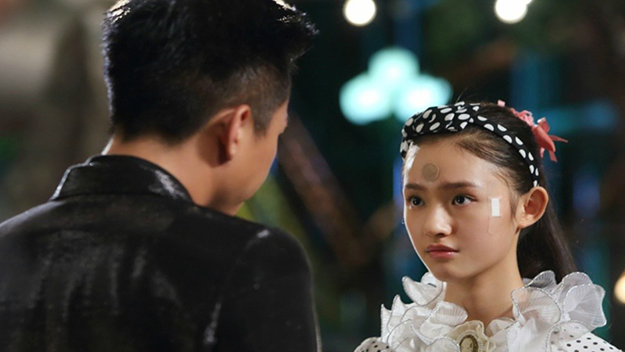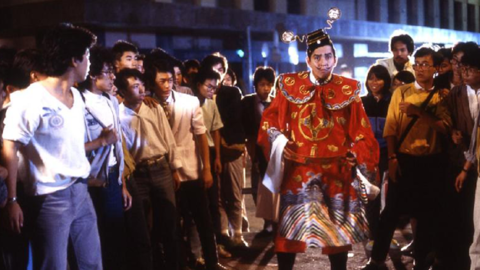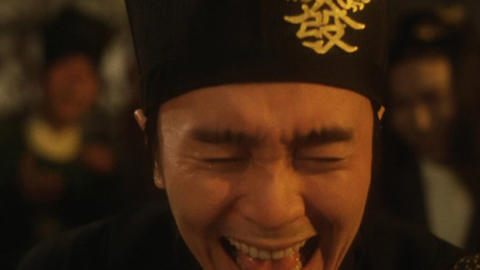Review: The Mermaid

After only 12 days in release, Stephen Chow’s comic fantasy The Mermaid became China’s top-grossing film of all time, at $375 million and counting. It is a testament to the remarkable and enduring popularity of Chow, an actor and director who has risen from Hong Kong “nonsense” comedies to become one of the most bankable names across Asia. Receiving a slow U.S. rollout from Sony Pictures, The Mermaid has all of the Chow hallmarks: it is an ebullient underdog story punctuated with cartoonishly violent slapstick, here pitting a group of militant mermaids against the developers who are destroying their habitat.
Chow became a Hong Kong star in the ’90s with hyper-local parodies of HK hits that were filled with jokey Cantonese wordplay (the uproarious God of Cookery, for example, is a takeoff on the God of Gamblers films). His brand of humor was known as moi lei-tau, or nonsense, and his anything-for-a-gag fearlessness brought him to the top of the box office in Hong Kong. His transition to Mainland, Mandarin-language blockbusters has made him shift from the specific to the general, and his recent films are CG-heavy spectacles for a pan-Asian audience, from which he has recently taken a break from acting. The Mermaid is the second straight film he has directed and not appeared in, after the demon-hunting hit Journey to the West.
What has not changed is the breakneck tempo and the literal broken necks of his slapstick. The Mermaid begins with the auctioning off of wildlife reserve Green Gulf, which is purchased by the slick mustachioed billionaire Liu Xuan (Deng Chao). One of the men he outbids is legendary Hong Kong director Tsui Hark (Peking Opera Blues), whose smirking cameo symbolizes an emerging partnership, as Hark is directing Journey to the West 2, which Chow is producing.

Liu plans to develop luxury real estate on Green Gulf with his buxom business partner Ruolan (Kitty Zhang), and installs piercing sonar to drive away the marine life. This happens to brutalize the local population of mermaids, mermen, and one truculent octopus-man (mantopus?) who live in a cliffside shipwreck. Driven out of the deep water by the sonar, they have been forced to live by the shore, closer to humanity. So they read the tabloids, listen to vinyl, and plot revenge against Liu and his company. The mantopus Brother Eight (Show Luo) concocts a plan: send out their most beautiful mermaid Shan (newcomer Jelly Lin) to seduce and then snuff out Liu, a notorious ladies man. But Shan is a bit of a klutz, and her initial assassination attempts inside Liu’s office are a symphony of self-destruction.
In order to enter the human world, Shan’s fin is split and the two sides are shoved into sneakers. She walks with a slow-moving hop, like a rabbit on downers. But she is nothing if not determined, and has poison-tipped spiky coral all set to hurl at Liu’s head, but it bounces off invisible glass panels and impales itself on her face. Woozy from the drugs, she gamely keeps aiming for the kill, but ends up stabbed through the hand and thwacked by Liu’s golf swing. Shan is relentless despite her escalating humiliation, a Wile E. Coyote for the mermaid cause.
Chow’s films have always been cartoonish in their violence, but now with CG he is giving them the look of animation as well. These are not textured, seamless effects, but sketches or outlines that can be exaggerated for comic effect. Brother Eight is an absurd figure to look at, with Show Luo decked out in long dreadlocks and a shell necklace, and that mass of CG tentacles bundled underneath. One of my favorite little jokes is how he speeds up by leaning backwards, his own version of automatic transmission. The longer running gag is how Liu’s hired goons keep trying to eat his tentacles raw, roasted, or fried. Whether it’s due to budget restraints or a conscious choice, you don’t need a photorealistic tentacle to elicit a laugh from that setup. All you need is the suggestion of one, and then Deng Chao’s slack-jawed reaction shot.

Violence and violent emotions are interchangeable in Chow’s films, tones that can change from scene to scene and sometimes shot to shot. So it is no surprise when Shan flips from clumsy killer to clumsier lover, and the odd mermaid-tycoon couple forms. Liu becomes entranced by Shan’s guileless sincerity, and Shan is determined to find the soul behind Liu’s money-grubbing exterior. It’s a shame, because decadent capitalist Liu is a great grotesque, one who doesn’t flinch when his sonar demonstration blows up a poor little goldfish. But regardless of his fame, Chow still has to get approved by the Mainland censors, so the capitalist Liu is very strenuously presented as a solid citizen.
Liu is shaken though when he discovers Shan’s mermaid-dom, which she had tried to keep a secret. This revelation sends Liu into a momentary tailspin, and to the cops. Liu divulges his mermaid story to two deadpan officers, who use the opportunity to monumentally screw with him. They pretend not to know what mermaids are, and informed that they are “half man, half fish”, they draw sketches in increasingly absurd combinations (head of a fish, body of the head of a man, etc.). This all ratchets up at rat-a-tat tempo until every character seems like a deranged lunatic. Fed up, Liu storms out of the precinct. Chow then cuts to the two cops cackling maniacally, but when Liu races back inside, the cops are stone-faced, staring at Liu as if he is the crazy one. I doubt I’ll see a funnier sequence all year.
Though estranged from Shan, Liu pokes around her claims of environmental catastrophe and is shocked at the extent of the damage, and at the destructive plans Ruolan has set in motion, plans which put all of Shan’s mermaid family in jeopardy. The climactic action sequence is one of shocking violence, the one instance where the characters’ cartoon bodies seem incapable of snapping back into place.

The Mermaid opened in New York City with no screenings for press and no publicity, despite its incredible success in China. But Chow has never had much luck with U.S. distributors. Miramax cut over 20 minutes out of Shaolin Soccer (01) and then shelved it for almost three years (it finally came out in August 2004). Sony Pictures Classics released Kung Fu Hustle (04) unscathed, and with a healthy amount of promotion, but that was the last time one of his films received a decent nationwide release. Stephen Chow doesn’t need America, but its multiplexes could certainly use him, as I wish Hollywood blockbusters were half as unhinged and fearlessly creative as The Mermaid.
R. Emmet Sweeney is a regular contributor to FILM COMMENT. He also writes a weekly column for Movie Morlocks, the official blog of Turner Classic Movies, and produces DVDs and Blu-rays for Kino Lorber.





